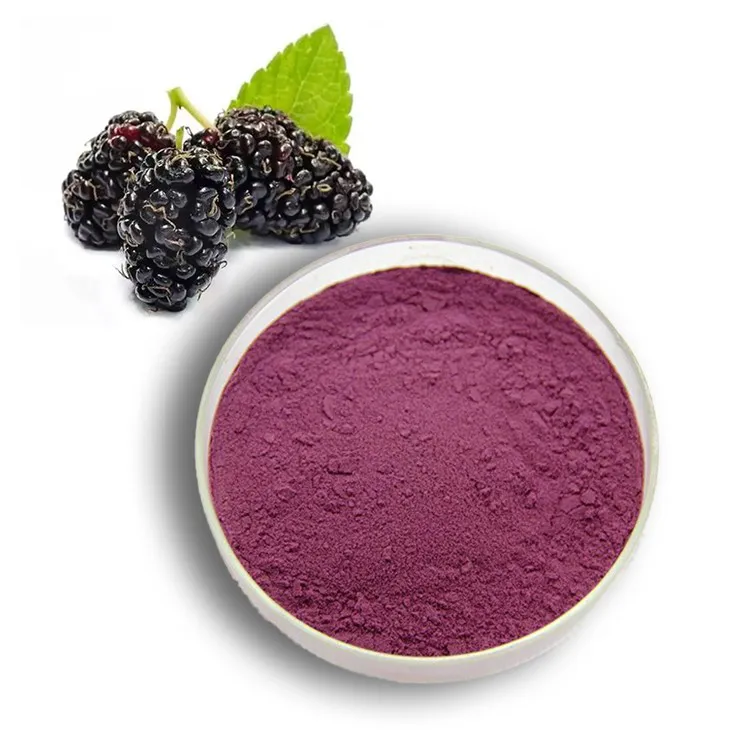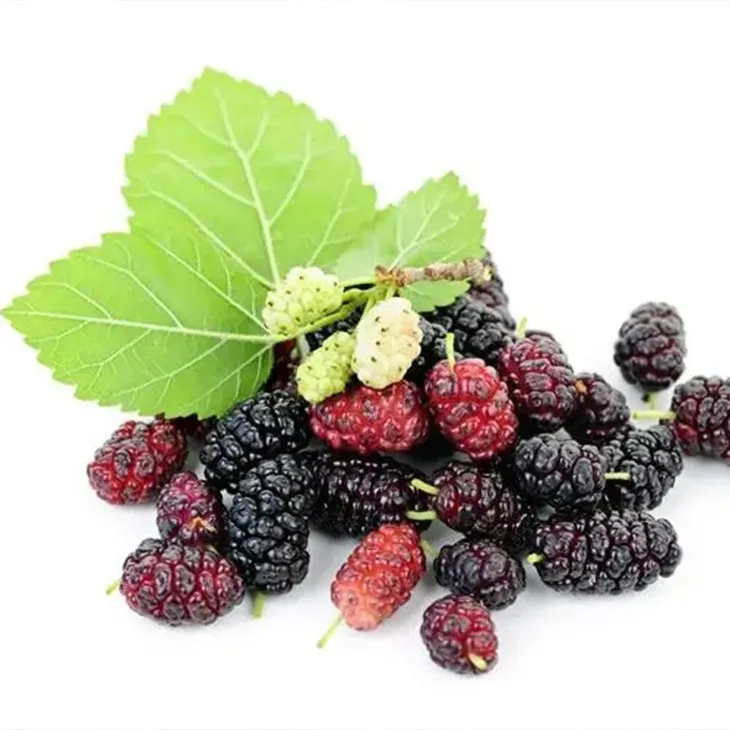- 0086-571-85302990
- sales@greenskybio.com
Does mulberry extract have benefits for diabetes? Are these all safe and applicable for diabetic patients?
2024-11-12

1. Introduction
Diabetes is a chronic metabolic disorder that affects millions of people worldwide. Management of diabetes often involves a combination of lifestyle changes, medications, and sometimes complementary therapies. Mulberry Extract has been the subject of interest in relation to diabetes due to its potential beneficial properties. This article will explore the efficacy and safety of Mulberry Extract for diabetic patients from multiple aspects.

2. The Composition of Mulberry Extract
Mulberry extract is rich in various bioactive compounds. These include:
- Polyphenols: Such as flavonoids (e.g., rutin, Quercetin) which are known for their antioxidant properties. Antioxidants can help reduce oxidative stress, which is often elevated in diabetic patients.
- Alkaloids: Some alkaloids in mulberry may play a role in regulating blood sugar levels.
- Amino acids: Essential and non - essential amino acids that contribute to overall health and may be involved in metabolic processes related to diabetes.

3. Efficacy of Mulberry Extract on Diabetes
3.1. Blood Glucose Regulation
Several studies have suggested that mulberry extract may have a positive impact on blood glucose regulation. In animal models of diabetes, mulberry extract has been shown to:
- Improve insulin sensitivity. Insulin is a key hormone in glucose metabolism, and in diabetes, insulin resistance is a common problem. By enhancing insulin sensitivity, cells are better able to take up glucose from the bloodstream, thus reducing blood glucose levels.
- Stimulate insulin secretion. Some components in the mulberry extract may act on pancreatic beta - cells, which are responsible for insulin production. This can lead to an increase in insulin secretion, helping to keep blood sugar in check.
3.2. Anti - inflammatory Effects
Chronic inflammation is associated with diabetes and its complications. Mulberry extract's antioxidant - rich nature gives it anti - inflammatory properties. It can:
- Reduce the production of inflammatory cytokines. Inflammatory cytokines such as TNF - α and IL - 6 are often elevated in diabetic patients. By reducing their production, mulberry extract may help mitigate the inflammatory state associated with diabetes.
- Protect against oxidative stress - induced inflammation. Oxidative stress can trigger inflammation in the body, and the antioxidants in mulberry extract can counteract this process.
3.3. Lipid Profile Improvement
Diabetes is often accompanied by abnormal lipid profiles, including high levels of triglycerides, low - density lipoprotein (LDL) cholesterol, and low levels of high - density lipoprotein (HDL) cholesterol. Mulberry extract has been found to:
- Lower triglyceride levels. High triglyceride levels are a risk factor for cardiovascular disease in diabetic patients. Mulberry extract may help reduce this risk by decreasing triglyceride levels.
- Improve the ratio of HDL to LDL cholesterol. By increasing HDL cholesterol and/or decreasing LDL cholesterol, mulberry extract can contribute to a more favorable lipid profile, which is beneficial for overall health and reducing the risk of diabetic complications.

4. Safety of Mulberry Extract for Diabetic Patients
4.1. General Safety Considerations
When consumed in moderation, mulberry extract is generally considered safe for most people. However, there are some important points to consider:
- Allergic reactions: Some individuals may be allergic to mulberries. Symptoms of an allergic reaction can include itching, rash, swelling, and in severe cases, difficulty breathing. Diabetic patients who are considering using mulberry extract should be aware of this risk and discontinue use if any allergic symptoms occur.
- Interaction with medications: Mulberry extract may interact with certain medications used in diabetes management, such as blood - thinning medications or drugs that lower blood sugar levels. For example, if a diabetic patient is taking metformin or other hypoglycemic agents, the combined use of mulberry extract may lead to an excessive drop in blood sugar levels. Therefore, it is crucial for diabetic patients to consult their healthcare provider before starting to use mulberry extract.
4.2. Purity and Quality of Mulberry Extract Products
The safety and efficacy of mulberry extract also depend on the purity and quality of the products available in the market. Some factors to consider are:
- Contamination: There is a risk of contamination with heavy metals, pesticides, or other harmful substances during the cultivation and processing of mulberries. Diabetic patients should choose high - quality mulberry extract products from reliable sources to minimize this risk.
- Standardization: The lack of standardization in the production of mulberry extract products can lead to variability in the content of active ingredients. This makes it difficult to ensure consistent efficacy and safety. It is advisable to select products that are standardized for their key bioactive components.
5. Current Research Limitations
Although there are promising findings regarding the potential benefits of mulberry extract for diabetes, there are also some limitations in current research:
- Most of the studies on mulberry extract and diabetes have been conducted in animal models. While these studies provide valuable insights, human clinical trials are needed to confirm the efficacy and safety of mulberry extract in diabetic patients.
- The long - term effects of mulberry extract use in diabetes are not well - understood. Diabetic patients often need to manage their condition over a long period, and it is essential to know if there are any potential long - term adverse effects or benefits of using mulberry extract.
- There is a lack of large - scale, well - designed clinical trials. The existing studies are often small - scale and may not have accounted for all the variables that can affect the results, such as diet, lifestyle, and comorbidities in diabetic patients.
6. Conclusion
In conclusion, mulberry extract shows potential benefits for diabetes in terms of blood glucose regulation, anti - inflammatory effects, and lipid profile improvement. However, the safety of mulberry extract for diabetic patients is not without concerns, especially regarding allergic reactions and potential interactions with medications. Moreover, current research has limitations, and more high - quality human clinical trials are needed. Diabetic patients should not rely solely on mulberry extract for diabetes management but should consult their healthcare providers before using it as a complementary therapy. Overall, while mulberry extract may hold promise as an adjunct in diabetes care, further research is required to fully understand its role and ensure its safe and effective use in diabetic patients.
FAQ:
Q1: What are the potential benefits of mulberry extract for diabetes?
Mulberry extract may have several potential benefits for diabetes. It may help in regulating blood sugar levels. Some components in mulberry extract are believed to enhance insulin sensitivity, which is crucial for proper glucose metabolism in the body. Additionally, it may have antioxidant properties that can protect cells from oxidative stress, which is often increased in diabetic patients.
Q2: How does mulberry extract regulate blood sugar?
The exact mechanism by which mulberry extract regulates blood sugar is not fully understood. However, it is thought that certain compounds in it may interact with insulin receptors or affect the enzymes involved in glucose metabolism. For example, it might influence the activity of glucokinase, an enzyme that plays a key role in the first step of glucose metabolism in the liver, thus helping to control blood sugar levels.
Q3: Is mulberry extract safe for all diabetic patients?
While mulberry extract is generally considered safe for most people, it may not be suitable for all diabetic patients. Some individuals may be allergic to mulberry or its components, which can cause adverse reactions. Also, if a diabetic patient is taking other medications, there could be potential interactions. For example, it may enhance the effects of hypoglycemic drugs, leading to an increased risk of hypoglycemia. So, it is important for diabetic patients to consult their healthcare providers before using mulberry extract.
Q4: Can mulberry extract replace diabetes medications?
No, mulberry extract cannot replace diabetes medications. Although it may have some beneficial effects on blood sugar regulation, it is not a substitute for the medical treatments prescribed by a doctor. Diabetes medications are specifically designed to control blood sugar levels and manage the various complications associated with diabetes. Mulberry extract can be considered as a complementary approach, but only under the supervision of a healthcare professional.
Q5: How much mulberry extract should a diabetic patient take?
The appropriate dosage of mulberry extract for diabetic patients has not been clearly established. It can vary depending on factors such as the individual's overall health, the severity of their diabetes, and other medications they are taking. Generally, it is recommended that diabetic patients start with a low dose and gradually increase it while closely monitoring their blood sugar levels and any potential side effects. Again, it is crucial to consult a healthcare provider for personalized advice.
Related literature
- The Role of Mulberry Extract in Diabetes Management"
- "Mulberry Extract: Efficacy and Safety in Diabetic Patients"
- "Beneficial Effects of Mulberry on Blood Glucose Regulation in Diabetes"
- ▶ Hesperidin
- ▶ citrus bioflavonoids
- ▶ plant extract
- ▶ lycopene
- ▶ Diosmin
- ▶ Grape seed extract
- ▶ Sea buckthorn Juice Powder
- ▶ Beetroot powder
- ▶ Hops Extract
- ▶ Artichoke Extract
- ▶ Reishi mushroom extract
- ▶ Astaxanthin
- ▶ Green Tea Extract
- ▶ Curcumin Extract
- ▶ Horse Chestnut Extract
- ▶ Other Problems
- ▶ Boswellia Serrata Extract
- ▶ Resveratrol Extract
- ▶ Marigold Extract
- ▶ Grape Leaf Extract
- ▶ blog3
- ▶ Aminolevulinic acid
- ▶ Cranberry Extract
-
Organic Tongkat Ali extract powder factory.
2024-11-12
-
How to make powder with ashwagandha extract.
2024-11-12
-
Rosehip extract manufacturers from China.
2024-11-12
-
The best cat's claw extract in nature.
2024-11-12
-
Chinese Dandelion Leaf Extract Suppliers.
2024-11-12
-
Beetroot Powder
2024-11-12
-
Peppermint Oil
2024-11-12
-
Maca Extract
2024-11-12
-
Citrus bioflavonoids
2024-11-12
-
Ginger Extract
2024-11-12
-
Saponin Extract
2024-11-12
-
Phyllanthus Emblica Extract
2024-11-12
-
Echinacea Extract
2024-11-12
-
Eyebright Extract
2024-11-12
-
Natural grape seed extract
2024-11-12





















